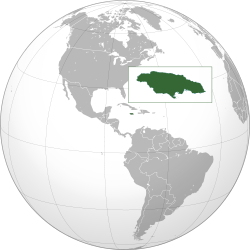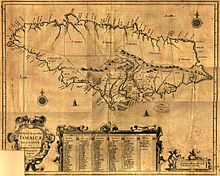The Jamaica Portal
Jamaica (/dʒəˈmeɪkə/ jə-MAY-kə; Jamaican Patois: Jumieka [dʒʌˈmie̯ka]) is an island country in the Caribbean Sea and the West Indies. At 10,990 square kilometres (4,240 sq mi), it is the third-largest island—after Cuba and Hispaniola—of the Greater Antilles and the Caribbean. Jamaica lies about 145 km (78 nmi) south of Cuba, 191 km (103 nmi) west of Hispaniola (the island containing Haiti and the Dominican Republic), and 215 km (116 nmi) southeast of the Cayman Islands (a British Overseas Territory). With 2.8 million people,0 Jamaica is the third most populous Anglophone country in the Americas (after the United States and Canada), and the fourth most populous country in the Caribbean. Kingston is the country's capital and largest city. Most Jamaicans are of Sub-Saharan African ancestry, with significant European, East Asian (primarily Chinese), Indian, Lebanese, and mixed-race minorities. Because of a high rate of emigration for work since the 1960s, there is a large Jamaican diaspora, particularly in Canada, the United Kingdom, and the United States. The country has a global influence that belies its small size; it was the birthplace of the Rastafari religion, reggae music (and such associated genres as dub, ska and dancehall), and it is internationally prominent in sports, including cricket, sprinting, and athletics. Jamaica has sometimes been considered the world's least populous cultural superpower. (Full article...) Selected article -The Invasion of Jamaica took place in May 1655, during the 1654 to 1660 Anglo-Spanish War, when an English expeditionary force captured Spanish Jamaica. It was part of an ambitious plan by Oliver Cromwell to acquire new colonies in the Americas, known as the Western Design. Although major settlements like Santiago de la Vega, now Spanish Town, were poorly defended and quickly occupied, resistance by escaped slaves, or Jamaican Maroons, continued in the interior. The Western Design was largely a failure, but Jamaica remained in English hands, and was formally ceded by Spain in the 1670 Treaty of Madrid. The Colony of Jamaica remained a British possession until independence in 1962. (Full article...) Did you know (auto-generated)
Selected biography -Richard Patrick Bennett OD, better known by the stage name Charlie Chaplin, is a Jamaican dancehall and ragga singer and deejay. It was common for Jamaican deejays of the era to name themselves after film stars or characters. Bennett, however, had been nicknamed after the comedian since his youth. His career began in 1980 when he began working with U-Roy's Stur-Gav Hi-Fi collective. He became extremely popular throughout Jamaica, memorable for his focus on cultural and social themes instead of the "slack" (rough, violent) lyrics that were popular at the time. His popularity as a live performer prompted Roy Cousins to produce some recording sessions with the young DJ. Chaplin's debut album was the Cousins-produced Presenting Charlie Chaplin in 1982, with several albums following for the producer over the next three years. The contrast between Chaplin's "culture" lyrics and the other major deejays of the day led to the 1984 "clash" album with Yellowman Slackness Vs Pure Culture. (Full article...) General images -The following are images from various Jamaica-related articles on Wikipedia.
This is a Good article, an article that meets a core set of high editorial standards.
Robert Nesta Marley OM (6 February 1945 – 11 May 1981) was a Jamaican singer, songwriter, and guitarist. Considered one of the pioneers of reggae, he fused elements of reggae, ska and rocksteady and was renowned for his distinctive vocal and songwriting style. Marley increased the visibility of Jamaican music worldwide and made him a global figure in popular culture. He became known as a Rastafarian icon, and he infused his music with a sense of spirituality. Marley is also considered a global symbol of Jamaican music and culture and identity and was controversial in his outspoken support for democratic social reforms. Marley also supported the legalisation of cannabis and advocated for Pan-Africanism. Born in Nine Mile, Jamaica, Marley began his career in 1963, after forming the group Teenagers with Peter Tosh and Bunny Wailer, which became the Wailers. In 1965, they released their debut studio album, The Wailing Wailers, which included the single "One Love", a reworking of "People Get Ready". It was popular worldwide and established the group as a rising figure in reggae. The Wailers released 11 more studio albums, and after signing to Island Records, changed their name to Bob Marley and the Wailers. While initially employing louder instrumentation and singing, they began engaging in rhythmic-based song construction in the late 1960s and early 1970s, which coincided with Marley's conversion to Rastafari. Around this time, Marley relocated to London, and the group embodied their musical shift with the release of the album The Best of The Wailers (1971). (Full article...) Selected picture - Buju Banton performing at New York's Apollo Theater during the 26th International Reggae & World Music Awards, 2007
Selected cuisines, dishes and foods -Jamaican cuisine includes a mixture of cooking techniques, flavours and spices influenced by Amerindian, West African, Irish, English, French, Portuguese, Spanish, Indian, Chinese and Middle Eastern people who have inhabited the island. It is also influenced by the crops introduced into the island from tropical Southeast Asia, many of which are now grown locally. A wide variety of seafood, tropical fruits and meats are available. Some Jamaican dishes are variations on cuisines brought to the island from elsewhere. These are often modified to incorporate local produce and spices. Others are novel or fusion and have developed locally. Popular Jamaican dishes include curry goat, fried dumplings, ackee and saltfish. Jamaican patties along with various pastries, breads and beverages are also popular. (Full article...)
More did you know
Selected listsTopicsCategoriesRelated portals
WikiProjectsGeographical:
History and Society:
Tasks
Associated WikimediaThe following Wikimedia Foundation sister projects provide more on this subject:
More portals | ||||||||||||




















































